Unlocking Social Potential in Children with Autism
Center-based Applied Behavior Analysis (ABA) therapy has emerged as a leading approach in fostering social development among children with autism spectrum disorder (ASD). This article explores the features, resources, and comprehensive benefits of center-based ABA, emphasizing its role in improving social skills, promoting generalization of learned behaviors, and supporting long-term social outcomes.
The Structure and Environment of Center-Based ABA Therapy
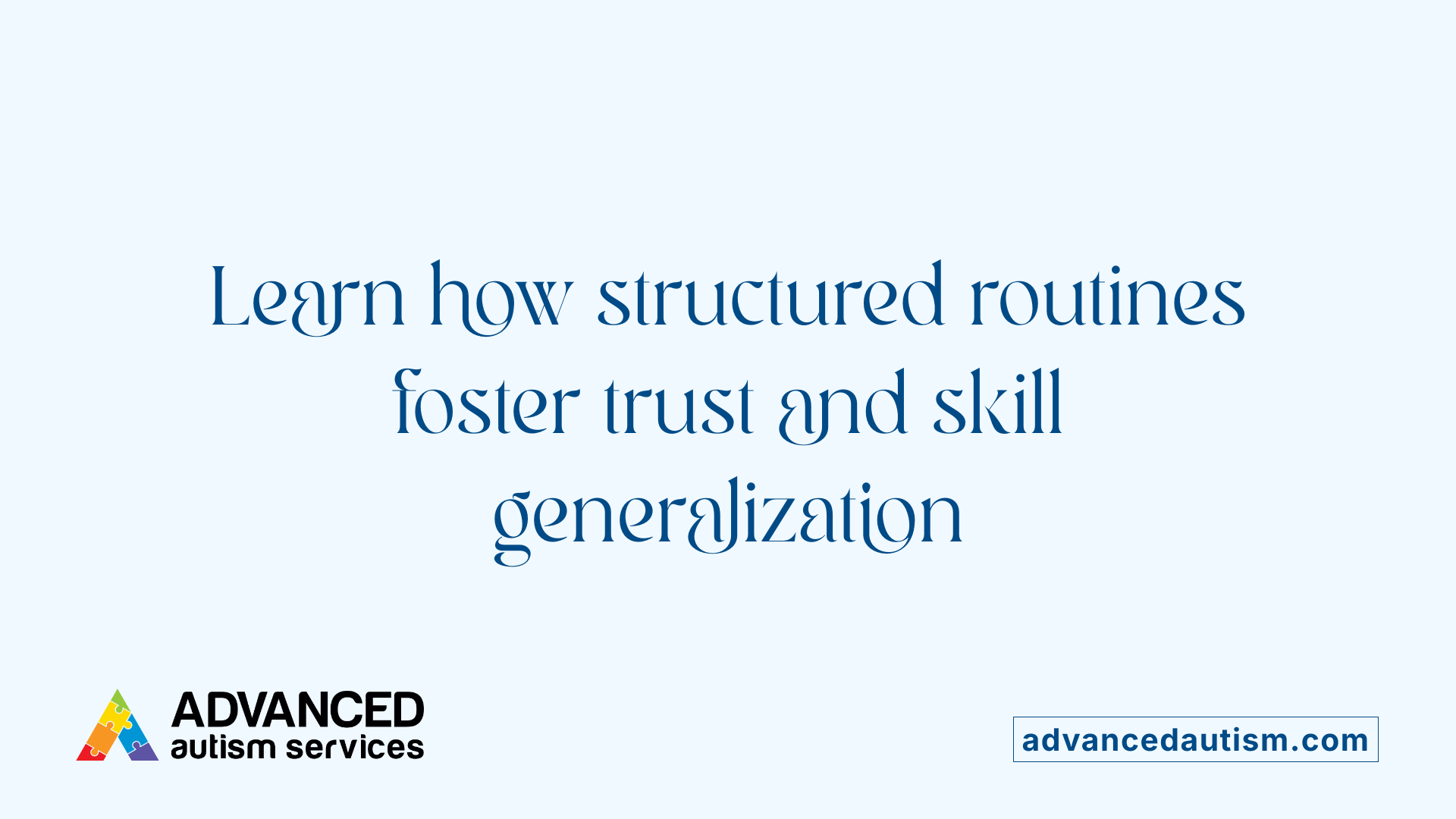
What features and resources of center-based ABA therapy promote social growth?
Center-based ABA therapy significantly enhances social skills through a variety of structured features and resources. These environments are carefully designed to include group activities, social skills classes, and peer interactions that encourage children to practice cooperation, sharing, taking turns, and building friendships. Such settings provide real-world social experiences, helping children learn to navigate social cues and develop meaningful relationships.
The centers are equipped with specialized tools like visual aids, communication devices, and educational toys tailored to each child's goals. These resources support communication, engagement, and independent play, which are essential for social development.
A multidisciplinary team—including BCBAs, speech therapists, occupational therapists, and communication specialists—collaborates to create individualized treatment plans. These plans focus on increasing social interaction, improving communication skills, and fostering social independence.
Regular assessments and systematic data collection enable continuous monitoring of progress. Therapists adjust strategies accordingly to maximize social growth.
Families are actively involved through training and support, which helps reinforce social skills at home and in the community.
Overall, the structured routines, diverse social activities, and tailored resources in center-based ABA therapy create an environment conducive to social learning, helping children form peer relationships and gain confidence in their social interactions.
How Center-Based ABA Fosters Social Interaction and Peer Learning
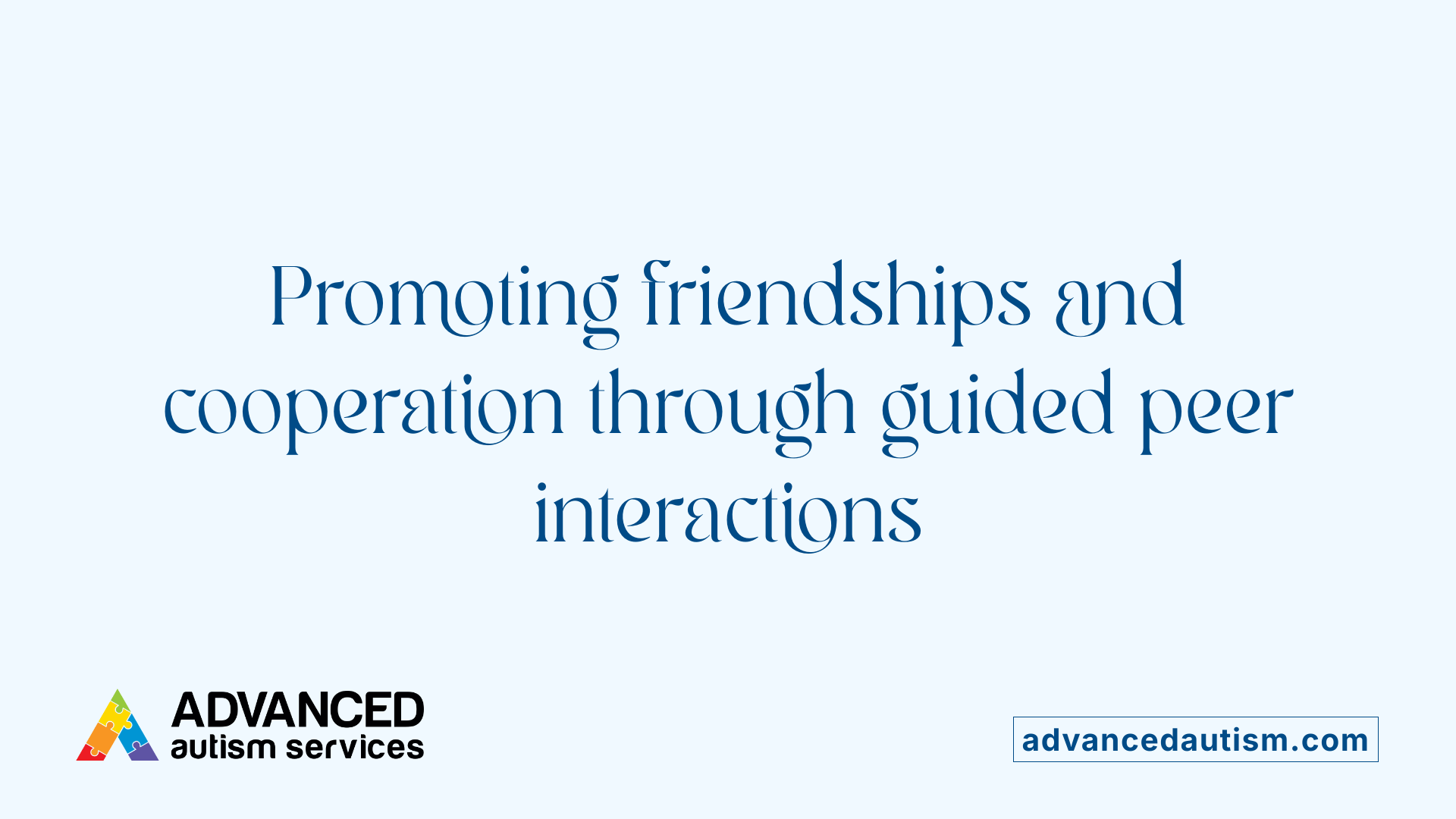
How does center-based ABA therapy support social skill development in children with autism?
Center-based ABA therapy is highly effective in nurturing social skills in children with autism. The structured environment provides ample opportunities for children to practice and develop critical social behaviors, such as making eye contact, sharing, and taking turns.
One of the core methods used is peer modeling and cooperative play. Children engage in group activities designed to promote interaction, where they can observe and imitate social behaviors modeled by trained professionals or peers. These structured group settings facilitate natural social exchanges, enabling children to learn social cues and improve their communication.
Social skills groups are specifically created to target skills like understanding emotions, greeting others, and initiating and maintaining conversations. These groups often involve role-playing, social stories, and cooperative games that help children internalize appropriate social responses.
Children also gain chances to practice social behaviors in real-world routines such as snack time, classroom transitions, or restroom routines. These everyday activities serve as practical platforms for applying learned skills in authentic settings, boosting social confidence and independence.
Overall, the center setting encourages meaningful peer interactions, offers guided support from trained therapists, and uses targeted activities to enhance social development—building friendships, improving cooperation, and mastering social cues essential for everyday life.
| Activity Type | Focus Area | Description |
|---|---|---|
| Group activities | Peer interaction | Encourage social practice through games and collaborative tasks |
| Social skills groups | Communication and emotions | Use role-play and social stories to teach social rules |
| Routine-based practice | Real-world skills | Apply social behaviors during daily routines like snack time or play |
| Peer modeling | Imitation of social behaviors | Children observe and imitate positive social responses |
This comprehensive approach ensures that children develop a well-rounded set of social skills aligned with their individual needs, reinforcing progress through consistent practice in a safe and supervised environment.
Benefits of Center-Based ABA for Social Development
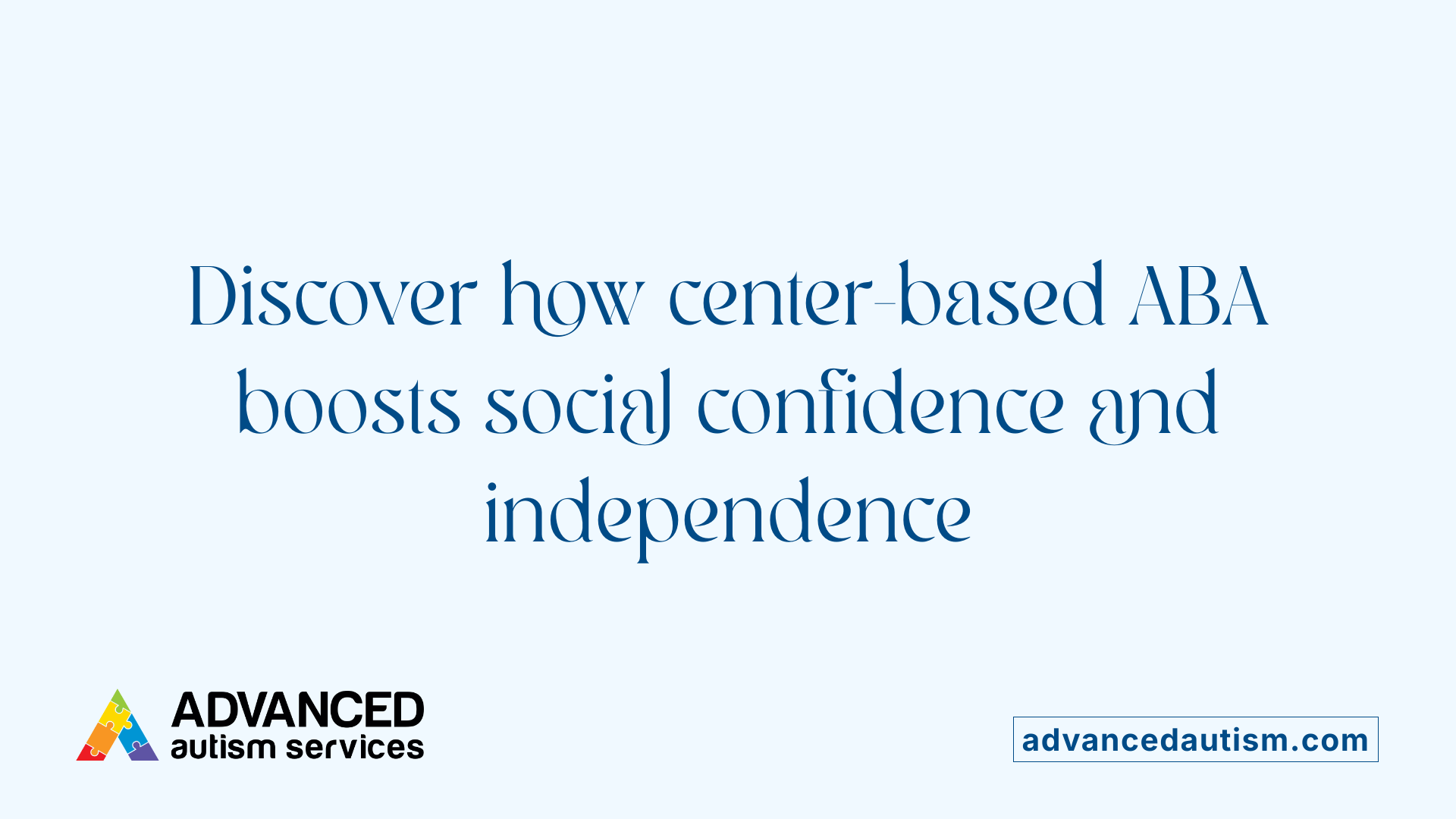
What are the benefits of center-based ABA therapy for social development in children with autism?
Center-based ABA therapy provides a highly structured environment designed specifically to boost social skills in children with autism. In these settings, children have numerous opportunities to practice essential social behaviors such as taking turns, sharing, initiating conversations, and engaging in role-playing.
The environment in centers facilitates group activities, peer interactions, and modeled social behaviors, which help children learn how to navigate social situations more effectively. Having access to trained professionals—including BCBAs, RBTs, speech therapists, and occupational therapists—ensures that interventions are tailored to each child's needs and that progress is closely monitored through data collection.
This professional oversight allows for real-time guidance and adjustments to social goals, maximizing learning outcomes. Children also benefit from exposure to social routines and interactions with peers, promoting skill generalization to other environments like school and community settings.
Overall, the structured yet dynamic nature of center-based ABA enhances children’s social communication, independence, and confidence, paving the way for improved social functioning and developmental success.
The Role of ABA in Shaping Positive Social Outcomes
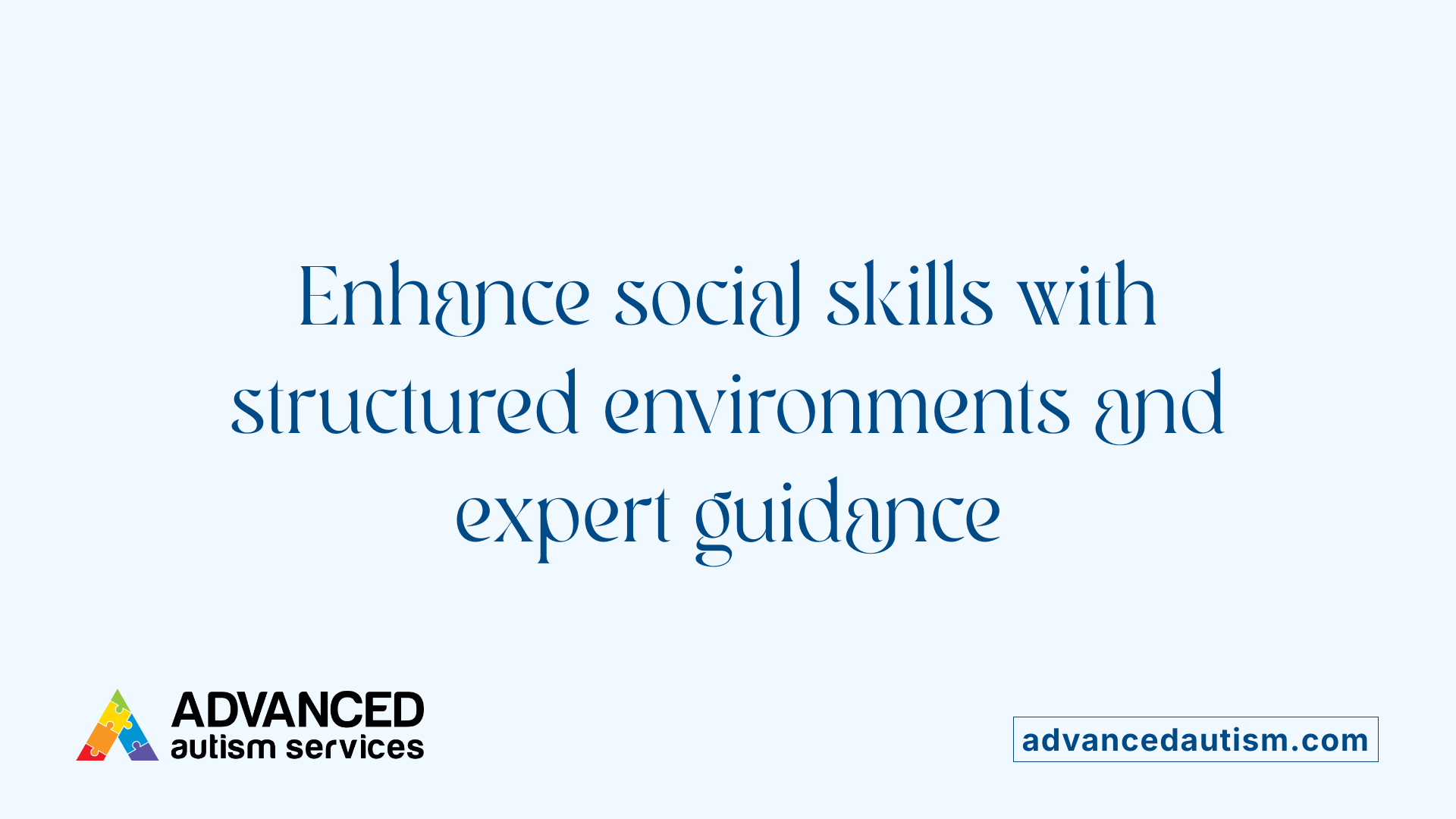
What role does center-based ABA therapy play in improving overall social outcomes for children with autism?
Center-based Applied Behavior Analysis (ABA) therapy is highly effective in fostering social development in children with autism. This structured environment provides numerous opportunities for children to practice and refine their social skills through peer interactions, group activities, and guided social routines.
Within centers, children learn to engage with others by participating in activities like sharing, taking turns, and greeting peers, helping to build confidence and social competence. These interactions are facilitated by trained professionals, including Board-Certified Behavior Analysts (BCBAs), RBTs, speech therapists, and occupational therapists, who ensure that behaviors are modeled appropriately and reinforced.
A major advantage of this setting is the ability to simulate real-world social scenarios in a safe space. Children practice skills such as emotional regulation, communication, and cooperation, which are essential for interactions outside the therapy context. For example, social skills groups and cooperative games teach children how to interpret social cues, understand others’ feelings, and respond appropriately.
The consistent routines and specialized tools in centers enable children to generalize these new skills across different environments, including school and community settings. Family involvement is also emphasized, with parent training programs that promote the reinforcement of social behaviors at home, further supporting ongoing progress.
Research, including a 2017 NIH study, highlights that children in center-based ABA programs master social and communication skills faster and more effectively than those in other models. The collaborative, multidisciplinary approach ensures that interventions are personalized and adapted as children grow, leading to sustained improvement in social participation and independence.
Overall, center-based ABA provides a comprehensive and dynamic platform for children with autism to achieve meaningful social growth, helping them develop the confidence to engage and thrive in a variety of social settings.
Specialized Tools and Materials for Social Skill Development
What features and resources of center-based ABA therapy promote social growth?
Center-based ABA therapy supports social development through a combination of structured activities, specialized tools, and a multidisciplinary approach. The environment is designed to facilitate interaction, communication, and learning among children.
One of the core features is the use of visual aids and communication devices. These tools help children understand social cues, express themselves, and follow routines more effectively. Educational toys and sensory equipment are also employed to motivate children and promote engagement during therapy sessions.
Tools specifically aimed at reinforcing social behaviors include turn-taking games, sharing activities, and role-playing setups. These activities simulate real-world social scenarios, making it easier for children to generalize learned skills.
To tailor the experience to each child's needs, centers utilize resources aligned with individual goals. Each child's treatment plan incorporates targeted strategies, which are supported by specialized materials and environment modifications. This personalized approach ensures that therapy addresses specific social challenges and developmental milestones.
Centers also foster social growth through group activities such as social skills classes, cooperative games, and peer interactions supervised by trained professionals. The diverse environment encourages children to practice communication, cooperation, and understanding social cues in a safe setting.
Team members, including BCBAs, speech therapists, and occupational therapists, continuously assess progress through data collection to refine strategies and ensure skill acquisition. Family involvement through parent training reinforces these skills at home, promoting consistency and better outcomes.
In summary, the combination of tailored tools, structured social opportunities, and professional oversight helps children with autism develop meaningful social relationships and improve their social independence.
| Feature/Resource | Purpose | Additional Details |
|---|---|---|
| Visual aids and communication devices | Facilitate understanding and expression | Flashcards, communication apps, picture exchange systems |
| Educational toys and sensory tools | Increase engagement and motivate learning | Educational blocks, sensory bins, calming tools |
| Turn-taking and role-playing games | Reinforce social behaviors | Board games, simulated social scenarios |
| Individualized resources | Meet specific social goals | Customized materials per child's treatment plan |
| Social skills classes | Promote peer interaction | Group activities focused on cooperation and communication |
| Family training and resources | Reinforce skills across settings | Parenting workshops, home practice strategies |
Resources for social skill development in ABA centers are abundant and tailored, promoting a comprehensive approach to social growth that benefits children with autism in many real-world settings.
The Significance of Routine and Consistency in Social Learning
What benefits does a structured environment provide in center-based ABA therapy?
Center-based ABA therapy offers a highly organized setting that is crucial for children with autism. This environment minimizes distractions, allowing children to focus better on learning tasks. It is designed with intentional routines and predictable schedules that foster a sense of safety and stability, making it easier for children to engage and participate.
Centers are equipped with specialized tools such as visual aids, communication devices, and sensory integration equipment. These resources support various learning styles and help children develop essential skills in communication, social interaction, and daily routines.
A team of trained professionals, including Board Certified Behavior Analysts (BCBAs), plays a vital role in delivering personalized care. They conduct assessments, analyze data, and tailor interventions to each child’s needs. Regular monitoring ensures that treatment remains effective and goals are adjusted as the child progresses.
The consistency provided by structured routines helps children build trust with caregivers and therapists. This predictability enhances their ability to learn new skills and reduces anxiety associated with unfamiliar situations.
Moreover, the stable environment supports the generalization of skills. Children are more likely to apply what they have learned in the therapy center to other settings like school and community, promoting broader social integration. The structured approach ultimately fosters better developmental outcomes and social learning for children with ASD.
Family Involvement and Long-Term Support in Center-Based ABA
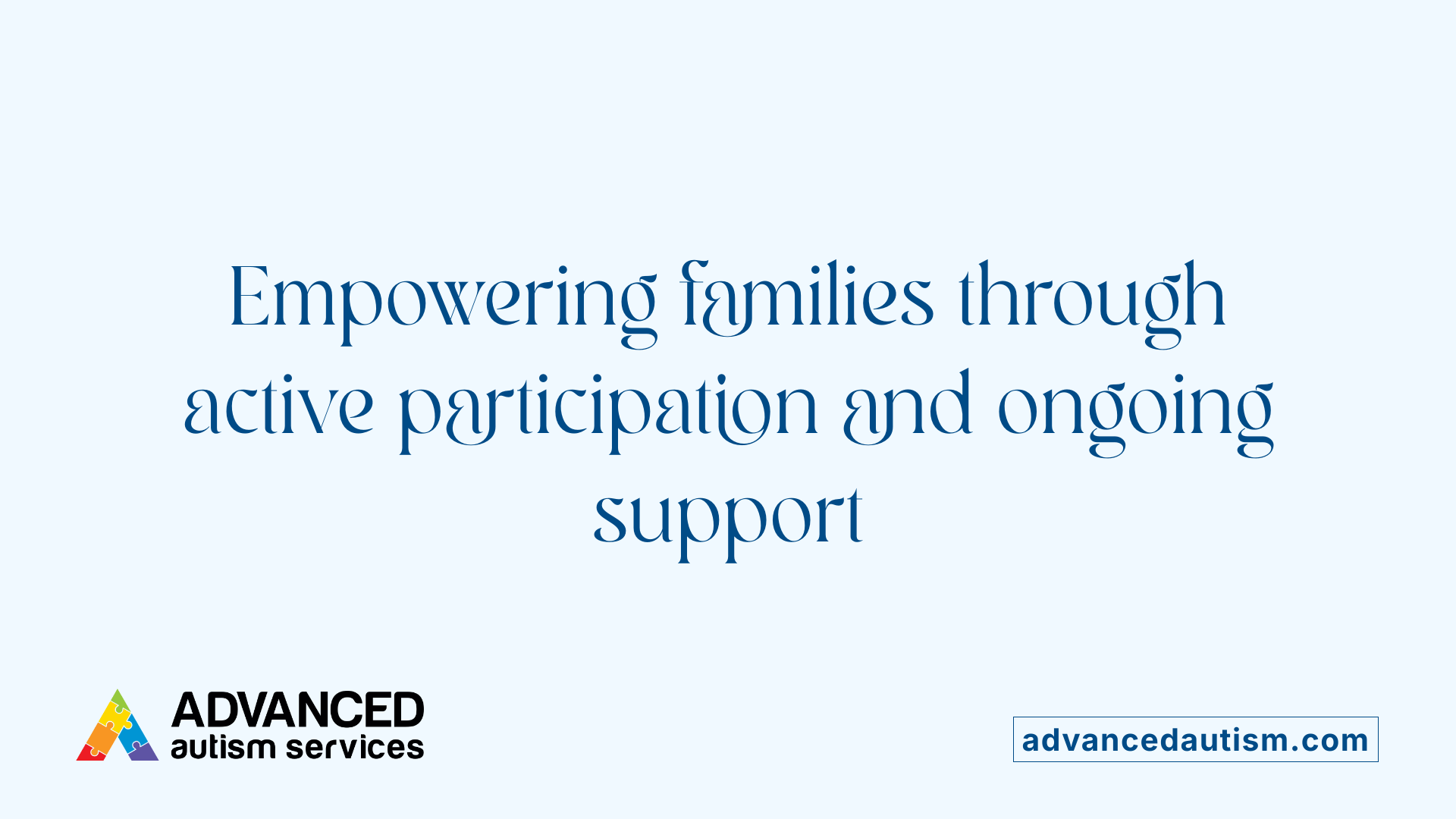
What role does family involvement play in the success of center-based ABA therapy?
Family involvement is a vital component of effective center-based ABA programs. Centers actively support family participation through education, parent training, and providing valuable resources. This collaboration encourages parents to become active partners in their child's development.
By participating in training and receiving guidance on ABA strategies, parents learn how to reinforce skills at home and in community settings. This consistency helps children generalize what they learn during therapy sessions, making progress more meaningful and enduring.
Moreover, parental engagement promotes confidence, empowering families to continue supporting their child's growth beyond the therapy center. Regular updates and ongoing assessments help families understand their child's development, making it easier to adapt strategies over time.
Transition planning is also an essential part of comprehensive support. As children progress, centers work with families to prepare them for different stages of therapy or for transitions into school and community environments. This ensures that gains are maintained and that children continue to develop social skills in real-world contexts.
Overall, involving families in the therapy process amplifies the benefits of center-based ABA, leading to better social adaptation, stronger skills, and improved quality of life for children with autism.
Empowering Children for a Social Future
Center-based ABA therapy provides an invaluable platform for children with autism to develop essential social skills within a structured, resource-rich environment. Its multidisciplinary approach, focus on peer interaction, and emphasis on consistency facilitate meaningful social growth that extends beyond the therapy setting. Continuous progress monitoring, family involvement, and personalized strategies ensure that children are equipped not only to succeed socially today but also to thrive independently in the future, fostering confidence, communication, and lasting relationships.
References
- The Benefits of Center-Based Therapy | Shelton, Fairfield County (CT)
- What Are the Benefits of Center-Based ABA Therapy?
- Center-Based Benefits | Ally Behavior Centers
- What are the benefits of center-based ABA services
- Top Benefits of Center-Based ABA Therapy: Guide for Parents
- Center-Based ABA Therapy Advantages for Autism Care
- Exploring Center-Based ABA Therapy for Your Child With Autism
- The Benefits of Center-Based Therapy | Shelton, Fairfield County (CT)
- Applied Behavior Analysis (ABA) | Autism Speaks
- Center-Based Benefits | Ally Behavior Centers



